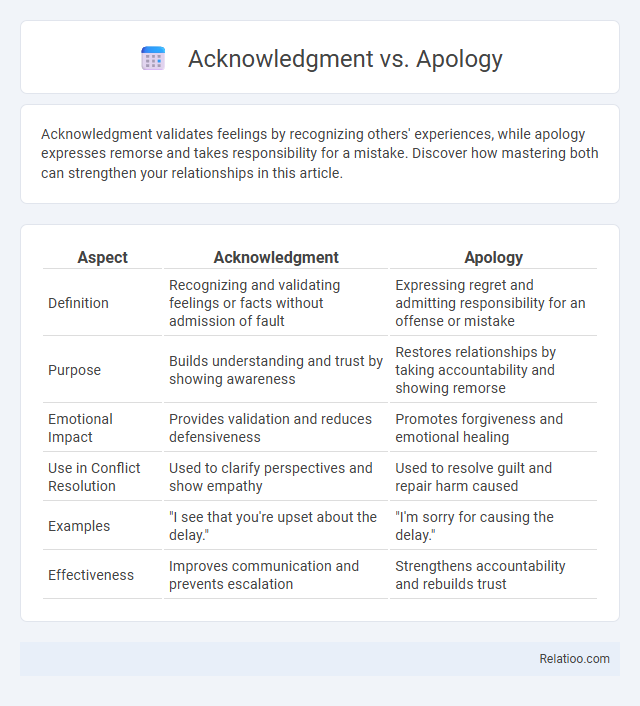Acknowledgment validates feelings by recognizing others' experiences, while apology expresses remorse and takes responsibility for a mistake. Discover how mastering both can strengthen your relationships in this article.
Table of Comparison
| Aspect | Acknowledgment | Apology |
|---|---|---|
| Definition | Recognizing and validating feelings or facts without admission of fault | Expressing regret and admitting responsibility for an offense or mistake |
| Purpose | Builds understanding and trust by showing awareness | Restores relationships by taking accountability and showing remorse |
| Emotional Impact | Provides validation and reduces defensiveness | Promotes forgiveness and emotional healing |
| Use in Conflict Resolution | Used to clarify perspectives and show empathy | Used to resolve guilt and repair harm caused |
| Examples | "I see that you're upset about the delay." | "I'm sorry for causing the delay." |
| Effectiveness | Improves communication and prevents escalation | Strengthens accountability and rebuilds trust |
Understanding Acknowledgment and Apology
Understanding acknowledgment involves recognizing and affirming someone's feelings or statements without necessarily admitting fault, ensuring clear communication and respect. Apology entails expressing regret or remorse for a wrongdoing, directly addressing responsibility to mend relationships and rebuild trust. Differentiating the two helps in conflict resolution by balancing emotional validation with accountability, enhancing interpersonal dynamics.
Defining Acknowledgment: Key Elements
Acknowledgment involves recognizing and validating another person's feelings, experiences, or statements without necessarily admitting fault or offering regret. Key elements include active listening, expressing understanding, and confirming the other person's perspective to foster mutual respect and communication. Unlike an apology, acknowledgment does not imply responsibility but serves to build trust and clarity in interactions.
What Constitutes a True Apology?
A true apology involves recognizing and explicitly admitting the specific wrongdoing, expressing genuine remorse, and committing to behavioral change, rather than merely offering an acknowledgment or vague regret. Unlike a simple acknowledgment that identifies an issue without emotional engagement or an apology that lacks sincerity, a true apology must convey empathy and responsibility to rebuild trust effectively. The depth of acknowledgment and emotional honesty differentiate a true apology from superficial responses and facilitate meaningful reconciliation.
Primary Differences Between Acknowledgment and Apology
Acknowledgment involves recognizing a fact, situation, or feeling without admitting fault or expressing regret, while an apology explicitly conveys remorse for a mistake or wrongdoing. The primary difference between acknowledgment and apology lies in intent; acknowledgment accepts reality or someone's perspective, whereas apology aims to repair harm caused. Understanding this distinction is crucial for effective communication and conflict resolution in personal and professional contexts.
Psychological Impact of Acknowledgment vs Apology
Acknowledgment validates an individual's feelings by recognizing their experience without necessarily admitting fault, fostering emotional safety and trust. Apology conveys regret and responsibility, which can facilitate healing by addressing harm directly but may sometimes be perceived as insincere if not matched by genuine understanding. The psychological impact of acknowledgment often leads to feeling heard and respected, while apology can promote reconciliation and reduce feelings of resentment when appropriately expressed.
When to Offer Acknowledgment Instead of Apology
Offering acknowledgment instead of an apology is appropriate when you need to validate someone's feelings or experiences without admitting fault or responsibility. You can strengthen communication by recognizing concerns or emotions, which shows empathy and respect while maintaining professionalism. Your choice to acknowledge rather than apologize enhances clarity and fosters trust in situations where no wrongdoing has occurred.
The Role of Intention in Acknowledgment and Apology
Acknowledgment involves recognizing someone's feelings or perspective without assuming fault, while apology conveys regret and responsibility for a specific wrongdoing. The role of intention is crucial in differentiating acknowledgment from apology: an acknowledgment aims to validate experience and foster understanding, whereas an apology intends to repair harm and express remorse. Intent shapes the effectiveness of both by influencing how sincerity and accountability are communicated in interpersonal or public contexts.
Common Misconceptions About Acknowledgment and Apology
Common misconceptions about acknowledgment and apology often confuse acknowledgment with an admission of fault, when in fact acknowledgment merely recognizes a situation or feeling without assigning blame. Apology involves expressing regret and responsibility for an offense or mistake, which is a deeper emotional and ethical act compared to acknowledgment. People frequently assume that acknowledgment alone suffices for resolving conflicts, overlooking the importance of sincere apologies in restoring trust and fostering reconciliation.
Effective Communication: Choosing the Right Response
Effective communication hinges on choosing between acknowledgment, apology, and acknowledgment in response to a situation. Acknowledgment affirms understanding the other party's feelings or concerns without assigning blame, fostering mutual respect and clarity. An apology conveys responsibility and regret for a mistake, essential for rebuilding trust and resolving conflicts efficiently.
Real-world Scenarios: Applying Acknowledgment and Apology
In real-world scenarios, acknowledgment involves recognizing a situation or mistake without necessarily expressing regret, serving to validate others' feelings or facts. An apology goes further by explicitly accepting responsibility and expressing remorse, often facilitating conflict resolution and relationship repair. Applying both appropriately strengthens communication: acknowledgment first affirms understanding, then apology addresses emotional impact, fostering trust and empathy in personal and professional interactions.

Infographic: Acknowledgment vs Apology
 relatioo.com
relatioo.com